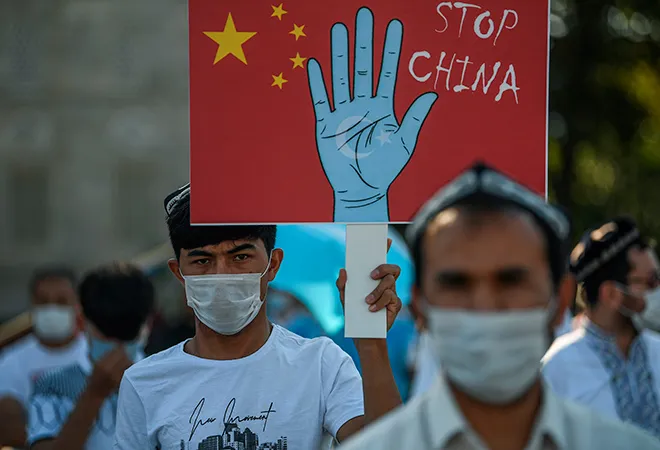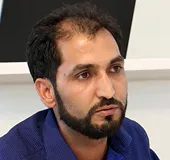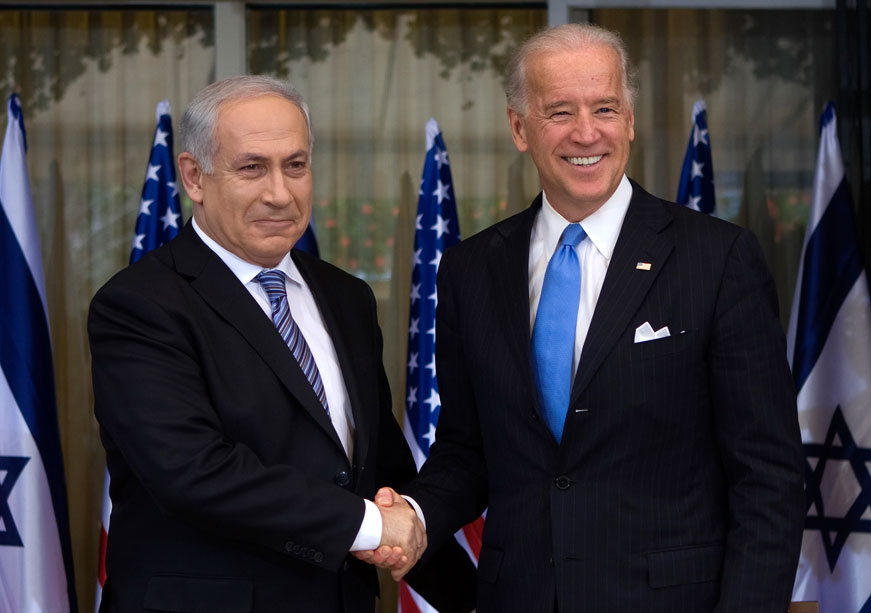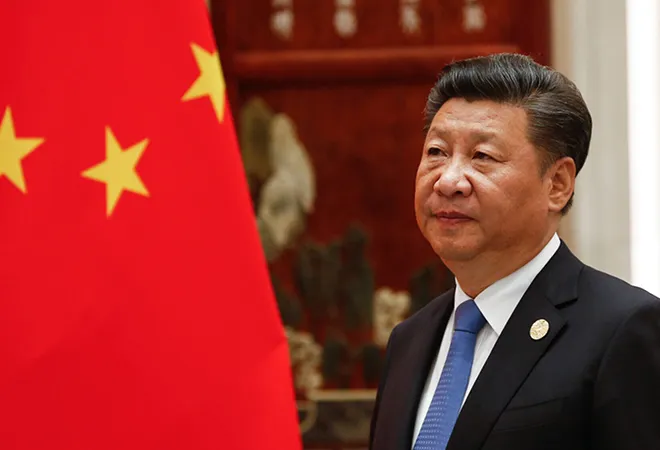Ankara will face pressure from within and outside its Parliament if it ratifies the extradition treaty with China.
China has recently ratified its extradition treaty with Turkey aimed at strengthened judicial cooperation to facilitate a crackdown on transnational criminals including terrorists. The treaty was signed during Turkish President Recep Tayyip Erdoğan’s visit to Beijing in 2017. However, the Turkish Parliament is yet to ratify it. If ratified by Ankara, the extradition treaty will have a devastating effect on the 50,000 strong Uyghur diaspora living in Turkey. Besides Turkey, China has already signed such extradition treaties to promote judicial assistance with 81 countries including Pakistan, Afghanistan and many Central Asian republics. Uyghurs who live in China’s north-western frontier province of Xinjiang speak a Turkish dialect and are considered ethnically Turkic. Because of its strong cultural, linguistic and religious linkages, Turkey has remained a popular destination for Uyghur emigrants in exile. After the 1950s, Ankara hosted many Uyghur leaders form China, who set up associations to preserve their culture and promote the cause of an independent Eastern Turkestan, but with little success.
Turkish politicians consider the Uyghurs as the forefathers of primordial Turkism.
Turkish politicians consider the Uyghurs as the forefathers of primordial Turkism.
Since 1990, the Uyghur diaspora in Turkey has become more vibrant and has attracted widespread attention globally through demonstrations, conferences, meetings and briefings. As China became a larger global economic player, Beijing started exerting pressure on Ankara to curb anti-Chinese activities by the Uyghur diaspora but with little effect. Ankara continued to tolerate, support and approve Uyghur activities. Most Turkish leaders and politicians felt historically and culturally attached to the Uyghur population of Xinjiang. Turkish politicians consider the Uyghurs as the forefathers of primordial Turkism. Such was the cultural bond between Uyghurs and Turks that until recent times the Eastern Turkestan flag and Turkish national flag were hung alongside each other in different cities of Turkey. On 28 July 1995, Erdoğan, then the mayor of Istanbul, named a section of Blue mosque in the heart of city after İsa Yusuf Alptekin, the leader of the Eastern Turkestan independence movement. In 2015, Turkish diplomats helped many Uyghurs in Southeast Asian countries to travel to Turkey and provided them with travel documents. China’s monumental rise and its hegemonic pursuits through the inauguration of the much-hyped Belt and Road Initiative (BRI) in 2013 increased the geo-strategic importance of its restive Xinjiang manifold. Three out of the six major BRI land corridors run through Xinjiang and under the guise of heightened security, the Chinese Communist Party (CCP) started repressive Sinicisation, hi-tech surveillance, re-education camps and increased the socio-economic exploitation of the indigenous Uyghur population. More than one million people were interned in re-education camps. Uyghur women — the powerful symbols of cultural identity — were forced to go for sterilisation, abortion and implantation of contraceptive devices through state-sponsored campaigns. This cultural onslaught and ethnic cleansing of Uyghurs in recent years has become the reeling point for Uyghur exiles in Turkey to highlight human rights violations committed by the CCP.
Beijing was also successful in arm-twisting many of the Muslim countries to stay silent at these forums.
Beijing was also successful in arm-twisting many of the Muslim countries to stay silent at these forums.
Beijing exploited its economic prowess to subdue increased criticism against it for human rights violations, forced labour, and cultural genocide of the Uyghurs at global forums. Beijing was also successful in arm-twisting many of the Muslim countries to stay silent at these forums. Under China’s economic obligations, Muslim countries also defended and commended China’s efforts in “protecting and promoting human rights through development.” Major Islamic countries including Saudi Arabia, Pakistan, Turkey, Malaysia and Iran have toed the official line of Beijing at these global forums when it comes to the ill-treatment of Uyghurs by the CCP. China, in the past, has used economic diplomacy and forced Muslim countries like Tajikistan and Kazakhstan to sign Extradition treaties and deport Uyghur exiles, who were sentenced to jail or executed. Turkey, the second home of the Uyghurs, is facing tremendous economic pressure because of the ill-conceived policies of President Erdoğan after the July 2016 coup attempt. Erdoğan believed that the West, particularly the US, are not trustworthy partners and that Washington was behind the instigated coup. Furthermore, Ankara’s behaviour towards Greece, the weaponisation of Syrian refugees, undermining the US’ Kurdish alleys, and the destruction of the last remains of democracy at home has led to a serious economic downturn, paving the way for increased Chinese influence. The relationship between NATO and Turkey soured further after Erdoğan purchased the S-400 missiles from Russia. Erdoğan turned to Beijing for a US$3.6 billion (£2.9bn) loan for investments in infrastructure and credit swap lines to boost its foreign reserves. Both the countries have started train services via Greater Central Asia and China is Ankara’s largest import partner. Beijing is also trying hard to pressurise Turkey to stop Uyghur activists in the country from protesting against the CCP by using its COVID-19 vaccine diplomacy.
If Turkey ratifies the treaty, this will be last nail in the coffin of Uyghur culture as China will silence the biggest Uyghur diaspora outside Xinjiang.
If Turkey ratifies the treaty, this will be last nail in the coffin of Uyghur culture as China will silence the biggest Uyghur diaspora outside Xinjiang.
The Uyghur exiles who fled from China to Turkey did not have citizenship documents and Ankara publicly denounced the treatment of Uyghur minorities till early 2019 as a “disgrace for humanity.” However, after early 2019, given its increased economic dependence on Beijing, Ankara has also been accused of secretly sending some Uyghurs back to China. Erdoğan has even praised the CCP on the Xinjiang issue. Ankara will face pressure from within and outside its Parliament if it ratifies the extradition treaty with China. The opposition and Turkish lawmakers have already decided to oppose the treaty as most of the clauses are ambiguous, as was stated by Yurter Ozcan, a representative in the US of the Turkish opposition Republican People’s Party. Erdoğan himself will also face criticism and protests if he ratifies the extradition treaty. Externally, there will be immense pressure on Erdoğan from NATO allies, especially when Ankara wants a good relationship with the European Union and as it tries to recalibrate its fraught relationship with the US after the recent sanctions. If Turkey ratifies the treaty, this will be last nail in the coffin of Uyghur culture as China will silence the biggest Uyghur diaspora outside Xinjiang. The treaty will become another instrument in the hands of China for the prosecution of its enslaved Uyghur minority.











